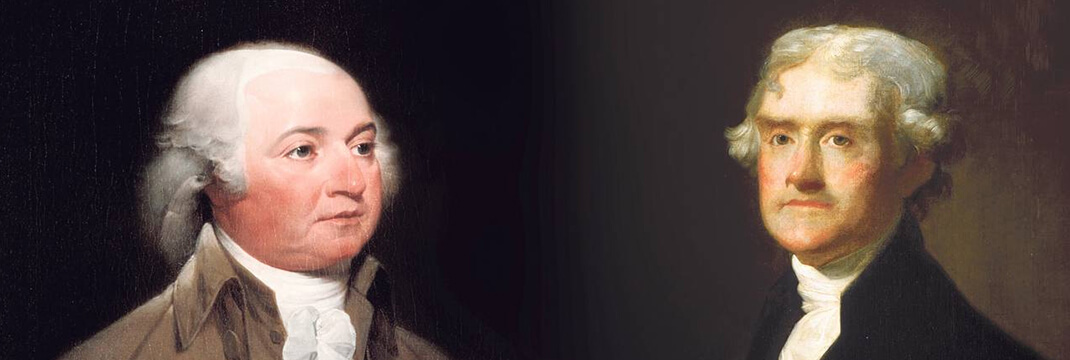
The 1800 presidential campaign was in many ways interesting because the aspirants were not only highly influential figures in the American politics, but were also Founding Fathers of American nation. Furthermore, the two had served as vice presidents and indeed contributed to the writing of the famous Declaration of Independence document and the Constitution of America. Jefferson and Adams had also been long time friends who participated in the struggle for the independence of America. As such, one would easily expect that the two would agree on all political issues and never part ways as it happened after the presidential election of 1800. This paper discusses the similarities and differences between Thomas Jefferson and John Adams. The paper also explores the sectional and socio-economic divisions that characterized the Jeffersonian and Federalist in the election. Finally, the paper will explore the friendship between Jefferson and Adams, which was severed during the presidential election, and why it resumed in sunset years.
Similarities and differences between Jefferson and Adams
Both Jefferson and Adams were among the elite group of Founding Fathers and leading advocates of the American independence. The two also served as vice presidents and presidents of the United States and participated in the writing of Declaration of Independence and the Constitution. Coincidentally, Jefferson and Adams died on the same day on July 4, 1826, a national day of independence in the country. Jefferson and Adams were pioneers of independent America who did much to shape the history of their country.
While Adams and Jefferson are regarded as great American politicians who helped to shape the political scene in America during their reign, the two were opposite of each other in terms of political views and human rights. Adams had freed all his slaves upon the declaration of independence in 1776 and did not own a single slave until his death. Jefferson, though opposed to slavery, secretly owned slaves. In fact, recent historical investigation reveals that he might have sired children with one of his slaves after he was widowed in 1782. Adams was a New England highflyer, highly educated and belonged to the class of political theorists who esteemed republicanism and advocated for central governance. While Adams maneuvered in between America and Europe in political stints, Jefferson concentrated in building political strongholds at home in Virginia wherefrom he led the American Revolution (Cappon 23).
Though Jefferson and Adams were great friends, the fact that they held divergent views politically drove them apart; making them rivals. Adams was a Federalist who loosely interpreted the Constitution and embraced national bank and a regime controlled by the wealth in the country. On the other hand, Jefferson was a Democratic-republican who insisted on the Constitution and stressed on the state rights. He believed that states should have equal rights as the federal government as this would mean that the governance of the country’s affairs was left in the hands of the people. Jefferson also wanted the federal government to be kept at a minimum to allow people to participate in the political affairs as they choose.
Jefferson and Adams were both worried about the future of the country after their retirement. They even exchanged letters explaining why they did what they did being in office. However, their continued differences were still evidenced since Adams was more concerned with signs of division among the states while Jefferson believed that giving more power to the state would bring about the kind of unity that both had envisaged during independence.
Invite your friends and get bonus from each order they
have made!
Sectional and socio-economic divisions that characterized the Federalist and Jeffersonian party
The 1800 presidential election was polarized on principal issues rather than political. Jefferson stood with the Democratic – Republican Party, which came to be popularly known as Jeffersonian Party because of his influence. On the other hand, Adams was Federalist who believed in the strong and powerful federal government. Furthermore, he had just ascended to a law which many people viewed as dictatorial. The Alien and Seditions Acts, which were signed into law 1798, resulted in many aliens leaving the country for fear of being prosecuted. As such, the Act did instigate fear in the populace. People feared that if Adams came in for a second term, more aliens would be prosecuted. Equally, there was a belief that the opposition would lose power because the acts outlawed some of the activities of the opposition, especially those who opposed federalism like Jefferson (Ferling 13).
The federalists had also been weakened by the death of George Washington in 1799, the father of federalism who had come to symbolize unity in the party. Because of a lack of a formidable party as evidenced in the disunity and disorganization of the federal party, Adams lost narrowly to Jefferson who had a strong support in New York and the south. Jefferson’s partner in campaign, Aaron Burr, a political maverick, successfully swayed the New York vote of Electoral College from federalism to Democratic-Republican and helped Jefferson to win the presidency.
On the other hand, Thomas Jefferson managed to garner more votes from supporters who were not satisfied with Adams’ policies on governance and national issues. Much of Jefferson’s support came from the inflated number of electors in the south, which included the slaves under the three-fifths negotiations. His humility was revealed at his swearing when he arrived alone on a horse with no escort while dressed in plain attire. These simple gestures indicated that Jefferson was ready to identify himself with the common citizens as opposed to Adams who identified himself with elites (Ferling 15).
Among the social-economic and sectional issues that characterized the presidential campaign were the powers of the state and the federal government. While Jefferson alongside Burr advocated for leissez faire form of governance, Adams and Pinckney advocated for a strong federal government. Adams was also a strong supporter of a national bank, military and federal taxation system. On the other hand, Jefferson was seen as progressive and accommodative. This is the reason why the Federal-controlled Congress settled for him as the lesser political evil compared to Burr with whom they had tied in the presidential elections. Socially, Adams was seen as a supporter of a retrogressive law who was aimed at prosecuting the aliens, editors, and the opposition after it became apparent that many aliens supported Jeffersonian party. Adams was also a diplomat but who did not negotiate with European countries like France. He believed that the French aliens were planning a revolution in America akin to French Revolution. On the other hand, Jefferson was seen as the People’s President as he identified himself with the common citizens who were agitating for a greater role in the economy and political scene. As such, he became a natural choice for the presidency despite the fact that he owned slaves, something that Adams did not approve (Ferling 32).
Jefferson and Adams have dissolved friendship and reconciled again
Adams and Jefferson had served as vice presidents and secretaries of the state prior to the 1800 presidential election. Adams had also served his first term as the president of the United States. Therefore, he felt that his trusted friend should not be the one to deny him a second term. Politically, Jefferson and Adams came from two different directions, with the latter advocating for a strong federal government that would possess sweeping powers across the country. On the other hand, the former was advocating for people’s leadership through states. Jefferson benefitted from the slaves votes from the South despite the fact that he had not openly opposed slavery like Adams had done. Thus, when Jefferson defeated Adams in the presidential election of 1800 narrowly; with 8 votes in the Congress, Adams felt that his competitor did not deserve to win the election. He also felt that Jefferson had unfairly benefited from the controversial Alien and Seditions Acts which were polarized by the Democratic-republican led by Jefferson. This culminated in the anti-Federalist movements and politics that caused Adams his second term of presidency.

Top Writer Your order will be assigned to the most experienced writer in the relevant discipline. The highly demanded expert, one of our top 10 writers with the highest rate among the customers.
Hire a top writer for $4.40Even though Adams had signed the Act into law in 1789, he felt that these acts were unfairly used during campaigns to deny him presidency and instead benefit Jefferson. This led to the dissolving of their friendship when Jefferson won the presidential elections on these grounds. The friendship resumed in 1812 after Jefferson had completed his two terms. It was because Adams felt that there were a lot that the two needed to share. Jefferson had also grown close to Adams’ wife with whom they exchanged letters. Equally, Adams was close to Jefferson’s daughter. The two ladies, Jefferson’s daughter and Adams’ wife, might have played a role in reconciling Jefferson and Adams. In their sunset years, the friendship became even stronger as Adams and Jefferson exchanged letters on issues of interest including politics, religion, science, and diplomacy. Indeed, Jefferson and Adams were bound together by fate because the two friends died on July 4, 1826 within a difference of five hours (Institute of Early American History and Culture 56).
Conclusion
From the above analysis, it is evident that both Jefferson and Adams had more in common than differences. From participation in the American Revolution to writing of the country’s Declaration of Independence and becoming American presidents, Adams and Jefferson exhibited characteristics that brought them out as American nationalists and patriots who had the best interest of their country at heart. After the reconciliation, the two founding father again exchange notes worrying about the future of the country they had parted ways over. Thus, it is interesting that the two died on the same day when the country was celebrating its jubilee year of independence.



